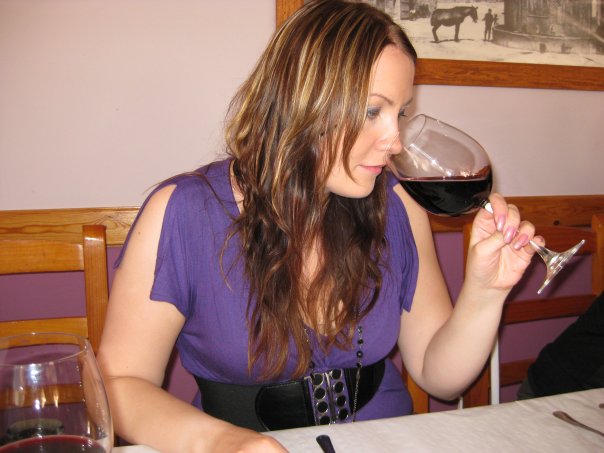Name: Ms. Elisa Närhi -

Nationality: Finland –
At the moment: Finland -
Please, tell us a little bit about your first encounter with wine & the wine industry. Did you have any particular mentors?
I was introduced to wines during my Bachelor of Hospitality Management studies 2006-2007 by studying the WSET level 2 and level 3 conducted by Senior lecturer Mrs Helena Rantasuo. Besides my wine studies, I worked in an alcohol retail store (Alko) as a salesperson. After graduating in 2009 I started certified sommelier studies at Turku Vocational Institute, where Mrs Anu Elomaa was my mentor. There I had plenty of theory and tasting training and an internship at Catalonia/Spain at Terra Alta, Celler Pinol with Mr. Juanjo Piñol as a mentor. Further on during my teaching studies, I had a mentor DipWSET Mr Kimmo Aho, who is my senior colleague as a wine educator.
What specific traits or skills should a Sommelier(e) possess for professional performance and is there any person with those qualities you especially admire within the wine industry?
Customer-oriented mindset and good teamwork and communication skills. The main assets in this occupation are good sensory analysis skills, interest in the food and beverages industry, and continuous self-development. One of my personal idols is the first Finnish MW Mrs. Essi Avellan who is considered the “queen of Champagne”.
What would be your advice to a young Sommelier(e)? How to find a good position at home or abroad? Any further tips?
I’d recommend having your internship period on a vineyard during the harvest or working as a waitress first and finding your mentors and connections. Also, the WSET courses are a good asset when applying to assistant sommelier and head sommelier positions. Working as a freelance wine writer, an influencer, or a lecturer is also a good paths to proceed in your sommelier career.
When a customer asks for advice on selecting wine what, in your opinion, would be the best approach?
It is essential to make your customers happy and not to recommend your personal favorite wines only. Get to know your customer and ask a few basic questions, for example: what are the customer’s flavor preferences (dry/sweet, light/full-bodied, etc.), budget, and occasion?
What is your philosophy about glasses? Are you working with well-known brands or are you considering new brands as well? How do you decide?
I usually work with Riedel glasses, yet I am also interested in smaller brands. I do enjoy my champagne from Lehmann glasses by P. Jamesse collection.
What advice would you give people on pairing wine with food?
Think of your wine pairing with food as if the wine was an extra sauce which will add more flavour and make the overall tasting experience even better. I think it is important to work together with the head chef and taste the flavor combinations to adjust the wine pairings to the menu combination. Balance, length, intensity, and overall tasting experience are important, and I’d suggest having for example non-alcoholic and low-alcoholic pairings, basic pairings, and more exclusive pairings to satisfy everyone’s palate and preferences. With food and wine pairings everyone is right 😊
Should a Sommelier(e) taste the guest’s wine?
The sommelier should taste every wine before serving in by-the-glass programs, and also if the guest allows the sommelier to taste the wine ordered by the bottle.
What are the key ingredients for creating a wine list for a restaurant and what is your opinion on pricing wine in restaurants, do you have tips on how to determine markups?
I prefer to plan a customer-friendly wine list, that is balanced, sustainable, and well-structured and fits the business concept and menu. It should have classics such as Champagne and other sparkling, light to full-bodied whites and reds, rose and cellar selection, dessert and fortified wines, and a decent selection of non-alcoholic choices. The pricing differs depending on the restaurant’s business idea and market e.g. rare availability of some premium cellar wines. I usually price the cellar wines with a euro-based gross margin, which is a better value for money. House wine doesn’t necessarily need to be cheap, since it is a good way to promote better quality to the customer.
How do you manage to stay on top of the changes in the wine industry?
Engage, taste, study, network, and travel actively. Teaching and sharing wine knowledge with the bachelor students keeps me up to date and I try to organize blind tastings quite often too to keep my palate and sensory skills in condition. I also attend wine fairs on a regular basis, and try different food and wine pairings at home, in restaurants, or during my travels.
How would a new vineyard get its wine noticed and what is the best way for producers to improve their chances of being listed?
Collaborating with a national wine association and importers and contacting wine writers/influencers to promote and market their wines. Local sommelier associations, vocational institutes, universities, and WSET course providers are important networks to promote new wines. In Finland, the alcohol retail monopoly Alko is a great pathway to promote new wines to the market.
If you were a wine, which variety would you be, and why?
Riesling – because it is a versatile and fruity variety with a strong character like I have.
Which top 3 types of wine (your faves would we find in your home wine collection and what’s your desert island wine?
Champagne, German and Alsace Rieslings, and Tokaj. My dessert island wine would be an elegant Mosel Riesling.
Thank you
Elisa
Looking for a Sommelier job? Feel free and check out on www.sommelier-jobs.com/sommelier-jobs/
Looking for the perfect wine list? Feel free to go to link

Dominik Kozlik e.U.
Gruberstraße 78/12
4020 Linz, Österreich